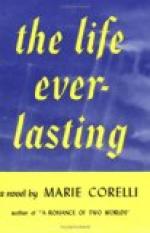so bloodthirsty and brutal, that one cannot now read
of them without a shudder of repulsion. Nevertheless,
from the very first dawn of his intelligence, man
appears always to have felt the necessity of believing
in something stronger and more lasting than himself,—and
his first gropings for truth led him to evolve desperate
notions of something more cruel, more relentless, and
more wicked than himself, rather than ideals of something
more beautiful, more just, more faithful and more
loving than he could be. The dawn of Christianity
brought the first glimmering suggestion that a gospel
of love and pity might be more serviceable in the end
to the needs of the world, than a ruthless code of
slaughter and vengeance--though history shows us
that the annals of Christianity itself are stained
with crime and shamed by the shedding of innocent blood.
Only in these latter days has the world become faintly
conscious of the real Force working behind and through
all things—the soul of the Divine, or the
Psychic element, animating and inspiring all visible
and invisible Nature. This soul of the Divine—this
Psychic element, however, is almost entirely absent
from the teaching of the Christian creed to-day, with
the result that the creed itself is losing its power.
I venture to say that a very small majority of the
millions of persons worshipping in the various forms
of the Christian Church really and truly believe what
they publicly profess. Clergy and laity alike
are tainted with this worst of all hypocrisies—that
of calling God to witness their faith when they know
they are faithless. It may be asked how I dare
to make such an assertion? I dare, because I
know! It would be impossible to the people of
this or any other country to honestly believe the
Christian creed, and yet continue to live as they do.
Their lives give the lie to their avowed religion,
and it is this daily spectacle of the daily life of
governments, trades, professions and society which
causes me to feel that the general aspect of Christendom
at the present day, with all its Churches and solemn
observances, is one of the most painful and profound
hypocrisy. You who read this page,—(possibly
with indignation) you call yourself a Christian, no
doubt. But are you? Do you truly think
that when death shall come to you it is really not
death, but the simple transition into another and
better life? Do you believe in the actual immortality
of your soul, and do you realise what it means?
You do? You are quite sure? Then, do you
live as one convinced of it? Are you quite indifferent
to the riches and purely material advantages of this
world?—are you as happy in poverty as in
wealth, and are you independent of social esteem?
Are you bent on the very highest and most unselfish
ideals of life and conduct? I do not say you are
not; I merely ask if you are. If your answer
is in the affirmative, do not give the lie to your
creed by your daily habits, conversation and manners;
for this is what thousands of professing Christians
do, and the clergy are by no means exempt.




